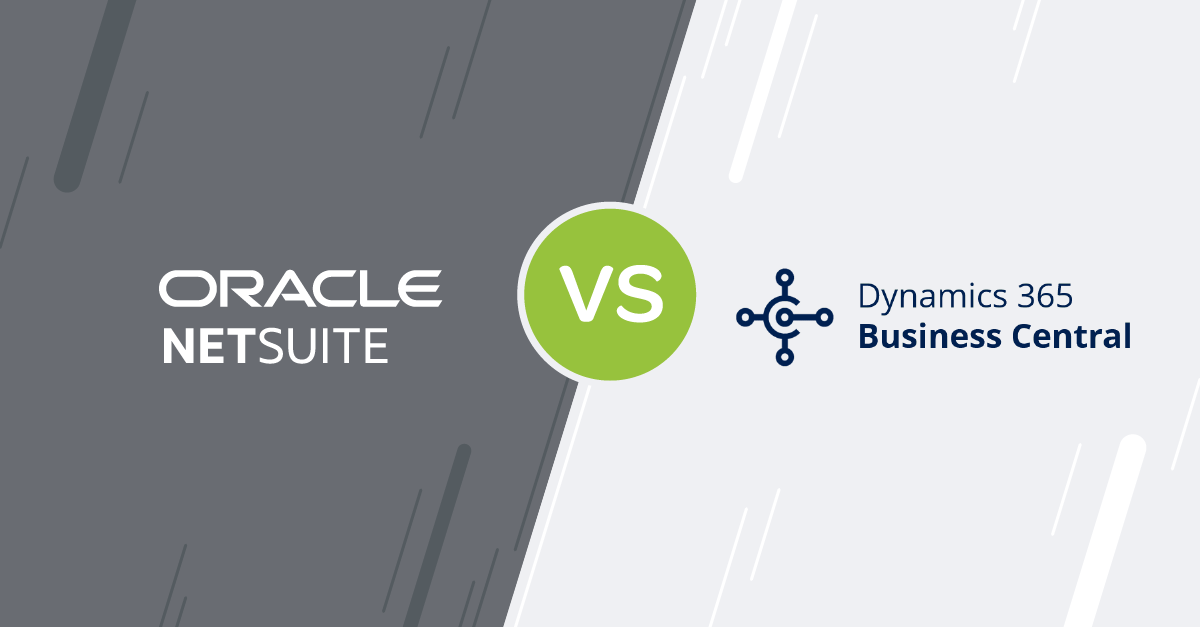Blog
Share this
ERP Comparison: NetSuite vs. Microsoft Dynamics 365 Business Central

by Carly Caines on October 21, 2025
When it comes to ERP, there are two names that you’ll likely hear: NetSuite and Microsoft Dynamics 365. At first glance, they may seem similar. Both offer modern cloud functionality and are great for businesses looking to move beyond spreadsheets and disconnected systems.
But they’re not the same.
There’s no shortage of opinions online, but very few comparisons give you an honest, side-by-side breakdown focused on fit, not features. That’s what we’re aiming to do here.
Full transparency: We’re a NetSuite Solution Provider. It’s one of the ERP solutions we’ve chosen to implement and support because we believe it offers the best value for our customers, but we also know that NetSuite isn’t the best fit for every business—and in some cases, Dynamics 365 may be a better fit.
When we say Microsoft Dynamics 365, we’re talking specifically about Dynamics 365 Business Central. It’s part of the broader Dynamics 365 suite, but Business Central is the product that typically goes head-to-head with NetSuite in the small to medium business space.
This article is here to give you a clear, objective comparison between NetSuite and Microsoft Dynamics 365 Business Central. We’ll highlight the real-world scenarios where one makes more sense than the other, and we’ll explain the differences in functionality in plain English—no jargon, no hype.
Let’s get into it!
What is NetSuite?
NetSuite is a fully integrated, cloud-based ERP platform owned by Oracle. It’s built to handle everything from financials and inventory to CRM, production and ecommerce—all in a single system. From day one, NetSuite was designed for the cloud and is used by many growing businesses worldwide.
NetSuite is known for its depth of functionality across multiple business areas, especially when it comes to multi-entity financials, global operations and real-time reporting. It’s a modular system, so you can add features as your business grows.
What is Microsoft Dynamics 365 Business Central?
Business Central is Microsoft’s ERP offering for small to mid-sized businesses. It’s part of the larger Microsoft Dynamics 365 suite, which includes tools for sales, marketing, customer service and finance.
Originally developed as an on-premise system (Navision), Business Central has been rearchitected for the cloud. While it now offers broad functionality, many of its deeper capabilities are still expanding as Microsoft continues to evolve the platform. This ongoing transition means Business Central works well for businesses with straightforward requirements today, while steadily becoming more robust over time.
It’s also a natural choice for teams that prefer to stay within the Microsoft ecosystem. If your business already relies on tools like Outlook, Excel and Teams, that familiarity can make Business Central feel more intuitive and cohesive for your team.
Finding the right ERP to fit your business
At a glance, NetSuite and Microsoft Dynamics 365 Business Central can look similar, but they’re built for different kinds of businesses. The best way to understand which is right for you is to look at situations where each system tends to fit best.
NetSuite is often a better fit if:
- Manage multiple entities, currencies or locations and need built-in financial consolidation across subsidiaries
- Are growing quickly and need a system that can scale with you
- Have unique workflows that require configuration or customization
- Work in a regulated industry or require complex reporting
- Want a single system to manage financials, inventory, CRM and more
Microsoft Dynamics 365 Business Central may work better if you:
- Operate in a single country or have a simpler business structure
- Are already deeply invested in the Microsoft ecosystem
- Prefer a familiar Microsoft-style interface and navigation
- Have narrow ERP requirements today but want flexibility to grow over time
Neither system is inherently better. Both can manage your core business processes effectively—the difference lies in how complex your operations are and how much flexibility you need as you grow.
NetSuite vs. Business Central: How do they compare?
Now that we’ve looked at where each ERP tends to fit, let’s break down how NetSuite and Microsoft Dynamics 365 Business Central stack up in a few key areas.
Here’s a side-by-side comparison to give you a quick overview.
| NetSuite | Microsoft Dynamics 365 Business Central | |
| Licensing & Pricing | Higher upfront cost with a modular subscription model based on users and functionality | Lower subscription cost based on users and functionality |
| Implementation |
Can be implemented by NetSuite, a Solution Provider or an Alliance Partner Can be implemented following a traditional design approach or through SuiteSuccess, a preconfigured, lower-cost option for smaller businesses |
Implemented exclusively by Microsoft’s global partner network |
| Customization | In-system tools for workflows, fields and reports, plus the SuiteCloud platform for more complex development | Customization through Visual Studio and Microsoft’s programming language |
| Integration | Can be integrated with other solutions using SuiteApps, connectors or custom integrations | Deep native integration with Microsoft 365 (Outlook, Excel, Teams), with further integration through the AppSource marketplace and Power Platform connectors |
| Financials |
Built for multi-entity, multi-currency and consolidation from the start Includes native modules for revenue recognition, subscription billing and payroll (in the US) |
Multi-entity consolidation and advanced financials are possible through configuration by a partner |
| Reporting & Analytics | Built-in saved searches and real-time dashboards, with more advanced capability in NetSuite Analytics Warehouse | Standard reports are limited; uses Power BI for advanced analytics |
| Artificial Intelligence (AI) | NetSuite Next and embedded AI deliver predictive insights, anomaly detection and workflow automation across modules | Microsoft Copilot assists with summarizing data, generating reports and content generation across the Microsoft ecosystem |
| Scalability | Designed for growth—handles complex structures and can add modules for more functionality as you grow | Well-suited for businesses with simpler requirements—scaling often requires more customization or partner support |
Licensing and pricing
Both systems follow a subscription model, but how pricing is structured—and what you get for that cost—differs.
NetSuite uses a modular subscription model where your price depends on your company size, number of users and the specific modules you choose. Because of that, there’s no simple, one-size-fits-all number for NetSuite pricing.
As a reference point, a NetSuite implementation can range from $30,000 to $250,000+, depending on the complexity and scope of your requirements. While it often carries a higher upfront cost than Business Central, it reflects the fact that NetSuite includes more extensive functionality out of the box and is designed to scale with complex businesses. If you have ambitious growth plans, that investment often pays off by reducing the need for constant customizations or clunky third-party add-ons later.
Microsoft Dynamics 365 Business Central has a more transparent pricing model, making it appealing for businesses with simpler needs or tighter budgets. Microsoft publishes its per-user subscription pricing publicly, so it’s easier to budget for. The system also offers a 30-day free trial, which allows you to explore the platform before committing. However, as your business grows, additional extensions and partner support can add to the overall cost—especially if you need more advanced functionality beyond the core offering.
No matter which solution you choose, it’s important to have clarity around the functionality, third-party apps and customizations you need to meet your needs—that will give you a clear picture of the cost.
Implementation
NetSuite can be implemented by NetSuite, a Solution Provider or an Alliance Partner.
Related Reading: Learn About NetSuite Partner Types
Most businesses use the traditional implementation model, where your partner takes a deep dive into your goals, challenges and outcomes, then configures NetSuite to provide the functionality you need. This approach takes longer and costs more, but it delivers a solution tailored to your processes.
For smaller businesses that are often moving off QuickBooks, SuiteSuccess offers a faster, lower-cost entry to ERP. It comes preconfigured with industry best practices and puts “the base in place” so you can get live quickly and add functionality over time.
Microsoft Dynamics 365 implementations are delivered exclusively through Microsoft’s partner network and follow a similar approach to the traditional implementation mentioned above.
Regardless of which ERP you choose, the quality of your implementation largely depends on the partner’s experience, methodology and understanding of your business. In either case, choosing the right partner is one of the most important factors in ERP success.
Customization
NetSuite is highly configurable out of the box. You can adjust workflows, create custom fields and build saved searches directly in the system. For deeper needs, the SuiteCloud platform allows for custom scripting and application development, keeping everything inside the NetSuite environment. While many configurations can be managed in-house, businesses often work with a partner for more complex customizations.
Microsoft Dynamics 365 Business Central also gives you the ability to personalize your experience. You can adjust pages, layouts, lists and reports right within the interface, without code. Developers—or your partner—can build extensions using Microsoft’s programming language to add functionality without altering the base system, which helps preserve stability during updates. As with NetSuite, more advanced customizations are often handled by an implementation partner.
Integration
NetSuite offers integration through the SuiteApp marketplace, which includes certified solutions that extend functionality across industries. Because most SuiteApps are developed within the NetSuite ecosystem, everything feels seamless instead of patched together.
You can also integrate NetSuite with Microsoft tools, ecommerce platforms or other business systems through APIs and prebuilt connectors. And if you need to connect to a system that doesn’t have a SuiteApp or connector available, a qualified NetSuite partner can build a custom integration for you. In those cases, vetting your partner’s technical capability carefully will be key to success.
Microsoft Dynamics 365 offers deep native integration with the Microsoft ecosystem, allowing you to access ERP data from familiar tools like Outlook, Excel, Teams and Power BI. Beyond that, the AppSource marketplace provides access to hundreds of integrations and add-ons, while the Power Platform (Power Automate and Power Apps) allows you to build connections and automations with minimal coding.
Financial management
NetSuite was designed to support complex financial operations from the start. You can manage multi-entity, multi-currency and consolidated financials in one place without relying on outside tools. If you need to manage more advanced processes like revenue recognition, subscription billing or payroll, those capabilities are built into the system. This makes it a strong fit if your business operates across subsidiaries, countries or industries with strict financial compliance requirements.
Microsoft Dynamics 365 Business Central also covers the core financials and can support advanced requirements with additional configuration or partner extensions. You can handle budgeting, cash flow and reporting natively, but features like multi-entity consolidation or subscription billing typically require extra configuration or third-party apps. If your business has a simpler structure and operates in one country, you’ll likely find the built-in capabilities sufficient.
Reporting and analytics
NetSuite includes real-time dashboards and saved searches that give you visibility into performance across your business. You can filter, sort and drill into data directly in the system, without exporting to spreadsheets. It offers a drag-and-drop report builder that makes it easy to create custom financial and operational reports without technical expertise. For deeper analysis, NetSuite Analytics Warehouse (NSAW) provides advanced analytics, trend reporting and data modeling—all directly tied into your ERP.
Microsoft Dynamics 365 includes standard operational and financial reports and works closely with Power BI for more advanced analytics. Power BI delivers strong data visualization and analysis tools, especially if your business already uses Microsoft 365. That said, since Power BI operates outside the ERP itself, it takes some setup to connect and maintain.
Artificial intelligence (AI)
AI is becoming a major differentiator for modern ERP systems, helping you save time, make better decisions and work more efficiently.
NetSuite uses Oracle Cloud Infrastructure (OCI) to power embedded AI capabilities and NetSuite Next (the next generation of NetSuite). These tools bring predictive insights, anomaly detection and workflow automation directly into your ERP. You can use AI to forecast cash flow, spot irregular transactions or even automate repetitive tasks like approvals. It’s designed to bring smarter decision-making into your daily processes, so they become part of how you work rather than a separate feature to manage.
Microsoft Dynamics 365 Business Central integrates Microsoft Copilot, which brings AI capabilities into the Microsoft tools your team might already be using. Copilot helps summarize data, create reports and draft emails in Outlook or update records in Excel using your data from your ERP. Those features are expanding quickly across the Microsoft ecosystem and if your business already runs Microsoft 365 tools, you’ll find those AI tools easy to adopt and connect with your ERP workflows.
So which ERP is better?
When it comes to comparing NetSuite and Microsoft Dynamics 365 Business Central, the better question isn’t which one is best overall, but which one is the best fit for your business.
If your company is growing quickly, operates across multiple entities or countries, or needs advanced financial consolidation and reporting, NetSuite often makes more sense. It’s built to handle complexity and scale, with a unified platform that connects all parts of your business as you grow.
If your business is smaller, operates in a single market, or already works heavily in the Microsoft ecosystem, Business Central may be the better fit. Its integration with the Microsoft tools you already use makes it familiar and accessible, and its flexible licensing model makes it easy to start small and expand gradually.
That said, no two ERP projects are the same. The right choice depends on your processes, reporting needs, industry and growth plans—and the only way to get a clear answer is to talk through those details with a partner from each system. A short discovery conversation can help you understand which ERP aligns best with your goals before you make a significant investment.
Share this
Stay in the Know!
Join other SMEs who receive our monthly ERP insights, tips and best practices.
You may also like

ERP Funding for Canadian Businesses

Should You Work with a NetSuite Implementation Partner or Go Direct?



